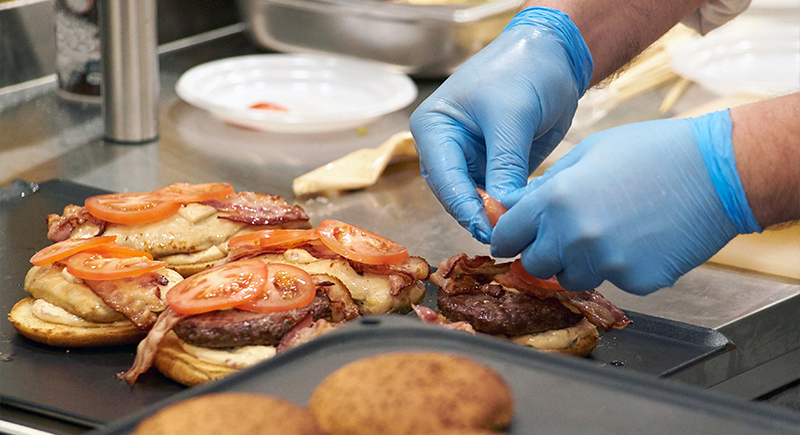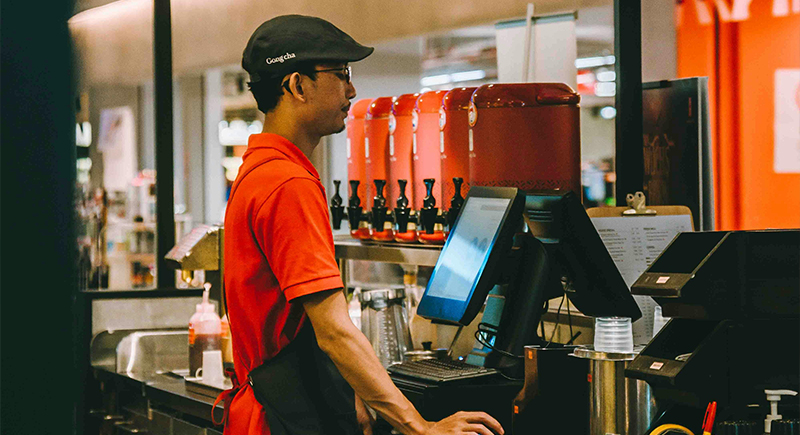Those golden arches and colorful mascots might paint a picture of fun and friendly vibes, but for many, the fast-food industry is a world far removed from that cheerful image. Behind the drive-thru windows and fryers lies a reality often filled with long hours, unpredictable schedules, and physical demands. So, before you lace up your slip-resistant shoes, here's a glimpse into the not-so-secret sauce of fast food work, backed by facts and figures:
Low Wages, High Turnover

Credit: iStockphoto
A 2023 Bureau of Labor Statistics report shows median hourly earnings for fast food workers at $15.54. This makes affording basic necessities a struggle, especially considering the high cost of living in many areas. Coupled with high turnover rates exceeding 150% annually (according to a National Restaurant Association survey), financial stability can be a distant dream. The constant cycle of new hires makes it challenging to build a team and can lead to inconsistent service quality.
Unpredictable Schedules

Credit: pixabay
Juggling school, childcare, or another job? Fast food schedules are notorious for being inconsistent, with split shifts, last-minute call-ins, and limited control over your hours. This makes it difficult to plan personal commitments or secure reliable childcare. Imagine working a closing shift until 10 p.m., only to be called in at 8 a.m. the following day for a surprise opening shift.
Fast-Paced Pressure

Credit: iStockphoto
Fast food isn't for the faint of heart. Meeting tight deadlines during peak hours can feel like a constant sprint. Juggling multiple orders at once, from burgers and fries to complex customizations, requires excellent multitasking skills. Add in impatient customers, and the pressure to maintain accuracy and stress and burnout become real threats to employee well-being.
Limited Benefits

Credit: iStockphoto
Health insurance paid time off, and retirement plans are often scarce benefits in the fast-food industry, making it difficult to plan for the future or manage unexpected health issues. According to a 2022 survey by the Economic Policy Institute, only 27% of fast-food workers have access to employer-sponsored health insurance. This means a minor illness or injury can cause a significant financial burden, and the lack of paid time off forces employees to choose between their health and their paycheck.
Weekend and Holiday Woes

Credit: pixabay
Forget weekend brunches or holiday celebrations with family. Fast food restaurants are busiest during these times, requiring employees to sacrifice personal time to keep the orders flowing. This can be especially difficult for those with children or extended families who rely on weekends and holidays for quality time together. Imagine missing your child's soccer game or spending Thanksgiving stocking fries instead of enjoying a family feast.
Repetitive Tasks and Limited Growth

Credit: iStockphoto
The daily grind in fast food can be monotonous, with repetitive tasks offering little opportunity for skill development or advancement. Assembling burgers, cleaning spills, and taking orders can quickly become mind-numbing, with limited opportunities to learn new skills or take on more responsibility. This lack of growth potential can be demotivating for those seeking a career path with opportunities for learning and development.
Customer Interactions (Not Always Pleasant)

Credit: iStockphoto
Dealing with angry customers, rude behavior, and unreasonable demands can take a toll on emotional well-being. Fast food workers are often on the receiving end of customer frustration, from missing fries to long wait times. Maintaining a positive attitude and de-escalating tense situations requires a significant amount of emotional intelligence and resilience.
Exposure to Heat and Hazards

Credit: pexel
Grills, fryers, and busy kitchens mean working in hot environments with the potential for burns or slips on greasy floors. Fast food kitchens can be hot and humid, especially during peak hours. The constant movement and pressure to work quickly can also increase the risk of slips, falls, and burns from reaching for hot equipment.
Limited Training

Credit: iStockphoto
Fast food training can be brief and leave employees feeling unprepared for the job's demands, leading to increased stress and potential mistakes. New hires are often thrown into the fire with minimal training in food safety procedures, complex equipment operation, and customer service techniques. This lack of preparation can lead to confusion, frustration, and a higher chance of errors.
Work-Life Imbalance

Credit: iStockphoto
Long hours and unpredictable schedules can make maintaining a healthy work-life balance difficult, impacting relationships and personal well-being. The fast-food industry often demands long hours, especially during peak seasons or weekends. This lack of control over your schedule can make planning personal commitments, maintaining relationships, or pursuing hobbies and interests outside of work challenging.
Emotional Labor and Forced Friendliness

Credit: pexel
Projecting a cheerful demeanor, even on bad days, is often an expectation in the fast-food industry, adding another layer of emotional strain. This concept, known as emotional labor, requires employees to constantly manage their emotions to meet customer expectations, regardless of how they're truly feeling. Faking a smile while dealing with a rude customer or hiding your frustration during a chaotic rush can be emotionally draining and lead to feelings of inauthenticity.
Limited Breaks

Credit: iStockphoto
Fast-paced environments often translate to short breaks or difficulty taking them at all, leaving employees feeling drained and exhausted. With constant customer flow and pressure to meet deadlines, taking a proper break can feel like a luxury. Even short breaks are crucial for recharging and maintaining focus, and skipping them can lead to fatigue, decreased productivity, and a higher risk of mistakes.
Lack of Recognition

Credit: iStockphoto
Feeling undervalued and underappreciated can be a common experience for fast food workers despite their crucial role in keeping the industry running. Fast-food employees play a vital role in the customer experience, ensuring orders are accurate, meals are prepared quickly, and the restaurant runs smoothly. However, this hard work often goes unnoticed, and employees may feel like their contributions are taken for granted.
Safety Concerns

Credit: pixabay
Late-night shifts and working alone can pose safety risks for fast food employees, especially when dealing with cash and potentially intoxicated customers. The combination of late hours, limited staff presence, and handling cash transactions can create an environment where employees feel vulnerable. This is especially true in areas with high crime rates, and fast food workers may worry about their safety while on the job.
